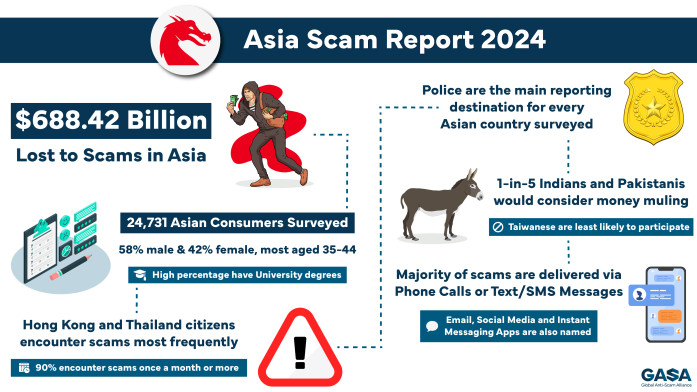The Global Anti-Scam Alliance (GASA) has released its 2024 Asia Scam Report, revealing that scammers cost consumers across Asia an estimated $688.42 billion over the past year. The report, based on a survey of 24,731 respondents across the region, highlights a rising trend in sophisticated scams, including the growing use of artificial intelligence (AI) and social media fraud.
The staggering figure accounts for a significant portion of the $1.026 trillion in global scam losses that GASA reported in 2023. According to GASA, the losses represent the increasing complexity of scams and the difficulty of combating them in a digital world, where fraudsters are quick to adopt new technologies to deceive victims.
Key Findings
One of the major trends highlighted in the report is the phenomenon of “revictimisation,” where individuals who have fallen for a scam once are highly likely to be targeted again. The report underscores the vulnerability of scam victims, with fraudsters often exploiting the personal details they have already obtained to launch follow-up attacks.
In contrast, some countries, such as Singapore and Japan, have made notable strides in reducing the financial impact of scams. Singapore, in particular, has seen a 40% reduction in the average loss per scam victim, while Japan has achieved a 17% decrease. These improvements have been attributed to increased collaboration between law enforcement and financial institutions. In Singapore, police and banks have co-located operations to enable rapid responses to scam cases, which has helped in cracking down on fraud.
However, the overall picture remains bleak for many countries across Asia, where social media has become a dominant platform for scams. Fraudsters are increasingly using popular social media channels to target unsuspecting users, creating fake accounts and running fraudulent advertisements that lead to identity theft, investment scams, and online shopping fraud. With social media companies struggling to keep pace with the proliferation of scam-related content, consumers are calling for stronger measures to address the issue.
Top Scam Categories
The report identifies identity theft, investment fraud, and shopping scams as the most prevalent forms of scams in Asia. Fraudsters have been exploiting multiple channels, including phone calls, text messages, and social media, to target victims. The use of AI to craft convincing messages has been a particularly concerning development, enabling scammers to impersonate legitimate companies or individuals with greater sophistication.
Scam Prevention in Focus at GASS Asia Summit
In response to the growing scam threat, GASA is set to host the Global Anti-Scam Summit (GASS) Asia Summit in Singapore on 20-21 October. The event will bring together key stakeholders, including global companies such as Amazon and Google, to discuss strategies for combating scams and enhancing consumer protection.
As foundation partners of GASA, Mastercard and ScamAdviser are sponsoring the event, which will focus on best practices in fraud prevention, the misuse of AI in scams, and cross-sector collaboration. With financial fraud on the rise, the summit aims to encourage cooperation between governments, businesses, and tech platforms to develop more robust defences against scam activity.
The 2024 Asia Scam Report sends a clear warning about the escalating threat of scams in the digital age, urging authorities and companies to act decisively to protect consumers. For more information, visit GASA’s official website.

